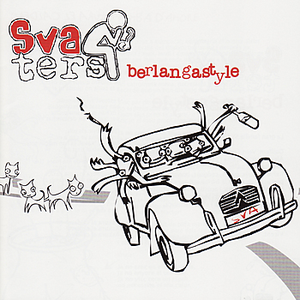Askura el Caldero
Sva-ters Lyrics
Jump to: Overall Meaning ↴ Line by Line Meaning ↴
A les 4 o 5 de la vesprà
Me'n puge per les palmeres
Duc una ceba monumental
La cassalla passa factura
Quan me n'adone tots han dinat
Al caldero queden els ossos
A la taula no queda ni el pa
I estovat en l'alameda
Han passat els municipals
I m'han posat una multa
Per "cassallero descrismat"!
Quan obric els ulls
Una xicona ve cap a mi
Em diu: "xaval, ja han mogut tots
T'han deixat tirat ací"
"El caldero és de ma mare
I l'heu deixat molt brut
Acompanya'm a ma casa
Que ho vaig a pagar amb tu"
Tomba't al sofà
Agafa aire que et toca escurar
Però no el caldero de ma mare
Sinó el que jo et vaig a ensenyar!
Askura el caldero!
Askura el caldero!
Askura el caldero!
The lyrics of Sva-ters's song "Askura el caldero" depict a scene of a day of cooking paella, a popular Spanish rice dish, and the aftermath that follows. The singer of the song climbs up palm trees to bring an impressive onion for the paella, but as he arrives, he realizes that everyone has already eaten and only the bones are left in the pot. As he rests on a bench in the park, police officers come by and give him a ticket for being a disorganized paella cook, a "cassallero descrismat." As he wakes up, a girl approaches him, telling him that everyone has left and that the paella pot is dirty. She invites him to her house to help clean it up, but instead of cleaning his mother's pot, she shows him her own special technique of cooking paella, an Askura style.
The lyrics of the song showcase a light-hearted and comical representation of the culture around cooking paella in Spain. The singer's dedication to bringing the best possible ingredients for the dish, such as the monumental onion, emphasizes the importance placed on the quality of the food. The punishment from the police officers represents the seriousness of the cultural significance of paella, as it is not just a dish but a part of the heritage and identity of Spain. The song also highlights the social aspects of cooking paella, such as the community coming together for a shared meal and the teaching and learning of different methods to cook it.
Line by Line Meaning
El dia de les paelles
On the day of paellas
A les 4 o 5 de la vesprà
Around 4 or 5 in the afternoon
Me'n puge per les palmeres
I climb up the palm trees
Duc una ceba monumental
I bring a huge onion
La cassalla passa factura
The liquor takes its toll
Quan me n'adone tots han dinat
When I realize, everyone has already eaten
Al caldero queden els ossos
Only bones are left in the cooking pot
A la taula no queda ni el pa
There is nothing left on the table
I estovat en l'alameda
I get stuck in the park
Han passat els municipals
The police passed by
I m'han posat una multa
And they gave me a fine
Per 'cassallero descrismat'!
For being a drunken rowdy
Quan obric els ulls
When I open my eyes
Una xicona ve cap a mi
A girl comes towards me
Em diu: 'xaval, ja han mogut tots
She says: 'Dude, everyone has left
T'han deixat tirat ací'
They left you here stranded'
'El caldero és de ma mare
'The pot belongs to my mother
I l'heu deixat molt brut
And you have left it very dirty
Acompanya'm a ma casa
Accompany me to my house
Que ho vaig a pagar amb tu'
I'll make you pay for it'
Tomba't al sofà
Fall onto the sofa
Agafa aire que et toca escurar
Take a breath, you're going to have to dry
Però no el caldero de ma mare
But not my mother's pot
Sinó el que jo et vaig a ensenyar!
But the one I'm going to show you!
Askura el caldero!
Stir the pot!
Askura el caldero!
Stir the pot!
Askura el caldero!
Stir the pot!
Contributed by Riley K. Suggest a correction in the comments below.
